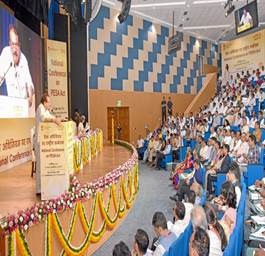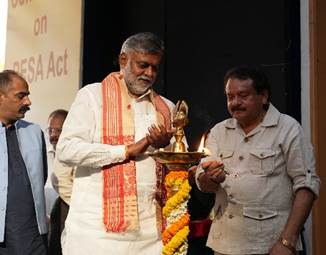MoS Prof. S. P. Singh Baghel inaugurates National Conference on PESA Act in New Delhi
Union Minister of State for Panchayati Raj Prof. S. P. Singh Baghel inaugurated and addressed National Conference on the Panchayats (Extension to Scheduled Areas) Act, 1996 (PESA) today at Dr. Ambedkar International Centre, New Delhi. Union Minister of State for Tribal Affairs Shri Durgadas Uikey delivered the keynote address during the valedictory session. This National Conference marks a major step forward in the Government’s commitment to enhancing governance and development in Scheduled Areas across the country. More than 500 participants from ten PESA States, including State Panchayati Raj Ministers, senior officials from Central and State Departments, representatives from all three tiers of the Panchayati Raj system and representatives from NGOs, attended the Conference, highlighting a nationwide commitment to the effective implementation of the PESA Act.
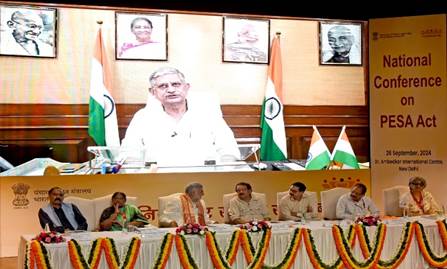
The launch of the PESA – GPDP Portal and Seven Specialized Training Modules was an important highlight of the PESA Conference. These resources are designed to enhance the effectiveness of Gram Panchayat Development Plans (GPDPs) and training initiatives. The PESA Conference aimed to ensure that the benefits of the PESA Act reach the grassroots level, promoting holistic development in these regions.
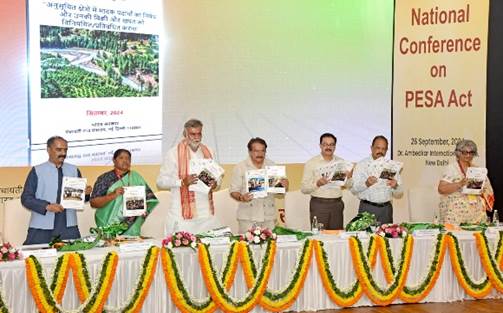
Delivering the keynote address, Prof. S. P. Singh Baghel said, “We must balance our rights with our responsibilities to effectively implement PESA on the ground. Guided by the vision of Prime Minister Shri Narendra Modi, we are committed to making PESA accessible and actionable for the residents at the grassroots level, embodying the ‘Lab to Land’ concept”. “The Ministry of Panchayati Raj is making concerted efforts to empower Gram Sabhas in PESA villages as strong and vibrant platforms, working in close collaboration with all line Ministries/ Departments and State Governments to ensure effective and holistic development”, he added.
Union Minister Prof. S. P. Singh Baghel emphasized the crucial role of women in the implementation of PESA, stating, “The empowerment and active participation of women in governance are paramount to the success of PESA in Scheduled Areas. Adequate funds, infrastructure, and access to better living standards, health, and education are essential to ensuring the all-round development of our tribal communities. Through these initiatives, we are committed to creating a brighter and more inclusive future for all.” Prof. Baghel further highlighted that the training modules released today are not merely theoretical but completely action-oriented, with practical steps included in every module to ensure ease of implementation. “The initiative of creating Gram Panchayat Development Plans under PESA provisions will prove to be transformative, as it expands the trainees’ understanding and enables them to implement the plans without practical difficulties,” he added.
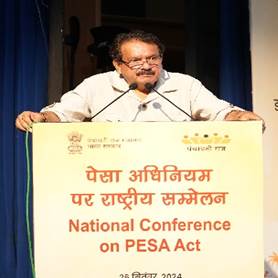
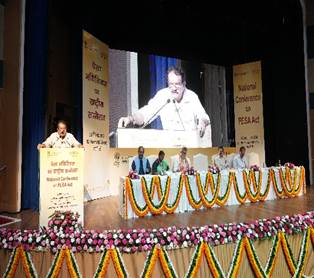
The National Conference featured addresses from Shri Prahlad Singh Patel, Panchayati Raj & Rural Development Minister, Madhya Pradesh, Shri Anirudh Singh, Panchayati Raj & Rural Development Minister, Himachal Pradesh, and Ms. D. Anasuya Seethakka, Panchayati Raj & Rural Development Minister, Telangana, who shared the progress, interventions and initiatives of their respective States towards the effective implementation of PESA. They discussed the integration of other related Acts, financial provisions, training activities and efforts to promote economic self-reliance while preserving cultural values.
The transformative steps taken by the Government of India was also discussed, which include the Janjati Adivasi Nyaya Maha Abhiyan (PM JANMAN) and the recently approved Pradhan Mantri Janjatiya Unnat Gram Abhiyan, which aims to bridge critical gaps in social infrastructure, health, education, and livelihood through convergence of government schemes to ensure sustainable and holistic development of tribal areas based on the learnings and success of PM JANMAN.
Addressing the valedictory session of the PESA conference, MoS Shri Durga Das Uikey stated that under the leadership of Prime Minister Shri Narendra Modi, significant work has been done in various areas for the upliftment of tribal communities and to bring them into the mainstream of development. Shri Uikey expressed hope that the capacity-building efforts initiated by the Ministry of Panchayati Raj for the office bearers of PESA Gram Sabhas will enable them to become well-acquainted with their rights and responsibilities, and this will prove to be a crucial step toward the effective implementation of PESA.
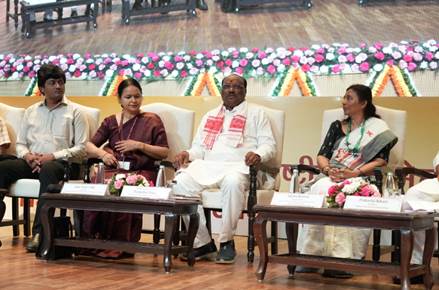
Secretary, Ministry of Panchayati Raj Shri Vivek Bharadwaj and Additional Chief Secretary, Panchayat & Rural Development Department, Government of Madhya Pradesh Shri Malay Shrivastava also spoke during the inaugural session.
Shri Vivek Bharadwaj stated that the core spirit of the PESA is to bring tribal communities into the mainstream of development while preserving their traditional culture and interests. As a result of efforts made over the past few years, most PESA States have now formulated PESA Rules. Shri Bharadwaj mentioned that in the past years, two regional workshops (organized this year at Pune and Ranchi) and one National Conference on PESA have been conducted, bringing all states together on a common platform. Emphasizing the need for capacity building of Gram Sabha representatives, elected Panchayat members and functionaries in PESA Panchayats, Shri Bharadwaj said that seven action-oriented training modules have been developed with the cooperation of the States, and the training of Master Trainers has also commenced.
Shri Bharadwaj urged all PESA Gram Sabhas to participate enthusiastically in the upcoming “Sabki Yojana, Sabka Vikas” campaign, starting on 2nd October 2024. He also informed that the Ministry is working towards establishing a center of excellence on PESA, which could potentially be set up in a central tribal university.
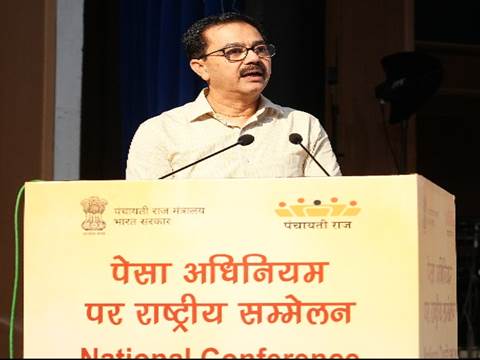
The action-oriented training modules developed under the PESA Act, 1996, address critical areas including Prevention of Land Alienation, Strengthening Gram Sabha, Control Over Money Lending, Customary Mode of Dispute Resolution, Intoxication, Minor Forest Produce, and Minor Minerals. These modules aim to empower PESA Gram Sabhas by providing comprehensive guidance on their delineated powers, enabling them to generate and manage Own Source Revenue (OSR), and preserving their socio-cultural norms and traditions. To further bolster PESA implementation, the Ministry of Panchayati Raj has introduced initiatives such as the Functional Activity Mapping Dashboard for monitoring State actions on the 29 Subjects outlined in the Eleventh Schedule of the Constitution, the PESA Training Manual for Vth Schedule Areas, and the PESA–GPDP Portal to facilitate village-based development planning. These efforts reaffirm the Ministry’s commitment to ensuring that the benefits of the PESA Act are effectively delivered to tribal communities in alignment with its true spirit.
NGOs and other organizations, including TEER Foundation, Akhil Bharatiya Vanavasi Kalyan Ashram (ABVKA), TRIF India, and Teesari Sarkar Abhiyan, participated in the technical sessions, sharing valuable insights and suggestions. The Ministry of Panchayati Raj has assured that all suggestions will be considered as part of the ongoing efforts to bring PESA implementation on the ground at the required pace. Panel discussions were held on key topics such as “PESA Gram Sabha: Visualising the Way Forward,” “Strengthening the PESA Economies: Forest Rights Act (FRA), Minor Forest Produce (MFP), and Minor Minerals,” and “Empowering the Last Mile: Saturation of PESA Training Modules and Effective IEC.” These discussions aimed at developing strategies for effective PESA implementation and ensuring that the economic benefits reach the tribal communities.
The purpose of the National Conference on the PESA Act is to highlight the experiences of various stakeholders working in the field of PESA through panel discussions, harmonize the PESA Act with other relevant laws such as the State Panchayat Act, Forest Rights Act, Mines and Minerals (Regulation and Development) Act, and Land Alienation Act, and to encourage Jharkhand and Odisha to finalize and officially enact their PESA Rules.
